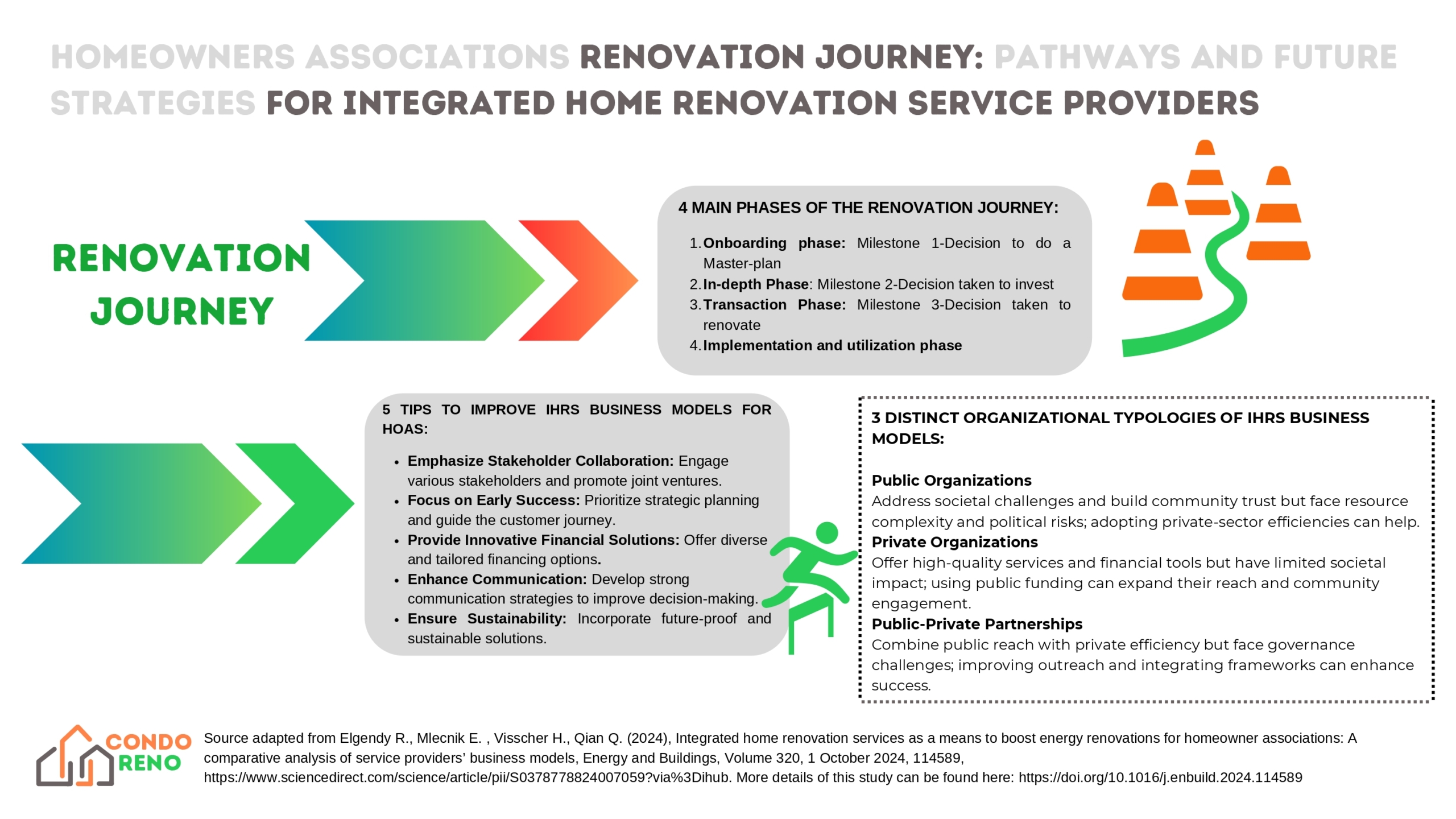New article on Accelerating energy renovations in Europe
The role of Integrated Home Renovation Services
CondoReno partners from TUDelft published a new study “Integrated home renovation services as a means to boost energy renovations for homeowner associations: A comparative analysis of service providers’ business models” in the Energy and Buildings Journal, Volume 320, 1 October 2024, 114589. This paper explores the current state of IHRS providers operating in four European regions with a focus on the Netherlands and Flanders. The study offers insights into the dynamics of their business models, strategies, and ways forward.

The European Union is on a mission to reduce its carbon footprint, and improving the energy efficiency of buildings is key to this effort. With nearly 46% of the EU’s population living in apartment buildings, which are responsible for a significant portion of energy consumption and greenhouse gas emissions, renovating these structures is crucial. However, Homeowner Associations (HOAs) that manage these buildings face a host of challenges, including financial constraints, legal complexities, and technical barriers, which slow down the renovation process.
The Challenges for Homeowner Associations
HOAs are responsible for organizing energy renovations, but they often struggle with high upfront costs, complex legal requirements, and a lack of technical expertise. Collective decision-making within HOAs can be slow, and the financial burden of renovations can be a significant deterrent, especially when the benefits are not evenly distributed among homeowners. Additionally, older buildings present unique technical challenges that require specialized knowledge and solutions.
The Role of Integrated Home Renovation Services (IHRS)
IHRS have emerged as a solution to these challenges. These services provide a comprehensive, one-stop-shop approach, guiding HOAs through every step of the renovation process. IHRS providers, which include public entities, private companies, and public-private partnerships, offer tailored solutions that address both the demand and supply sides of energy renovations.
- Public Entities focus on broad societal challenges, such as reducing energy poverty and improving urban livability, offering inclusive services to a wide range of homeowners.
- Private Companies emphasize operational efficiency and innovative financing solutions, targeting specific customer segments with high-quality renovation services.
- Public-Private Partnerships combine the strengths of both sectors, offering comprehensive services that balance efficiency with broad accessibility.
The Renovation Journey
The renovation process can be divided into four key phases: onboarding, in-depth analysis, transaction, and implementation. Each phase presents specific challenges and requires tailored solutions:
- Onboarding: Raising awareness, registering HOAs, and beginning the planning process.
- In-Depth Analysis: Conducting energy audits, developing master plans, and securing financing.
- Transaction: Finalizing legal agreements, securing funds, and preparing for construction.
- Implementation and Utilization: Executing the construction work and monitoring post-renovation energy performance.
Key Insights and Recommendations
- Collaboration is Crucial: Successful energy renovations require collaboration between public entities, private companies, and HOAs. Each can learn from the other to improve the overall process.
- Innovative Financing: Addressing financial barriers through creative solutions, such as rooftop extensions and living cost-neutral models, is essential to accelerate renovations.
- Streamlined Legal Processes: Simplifying legal requirements and providing HOAs with the necessary legal resources can significantly reduce delays.
IHRS providers are essential in helping the EU meet its energy efficiency goals by supporting HOAs through the complex renovation process. Their success depends on continued innovation in business models, financing, and collaboration across sectors. As the EU moves towards its 2050 climate targets, the role of IHRS providers will be increasingly important in ensuring that apartment buildings become more energy-efficient and environmentally sustainable.
Access and download the paper at the TUDelft website.
Interested in following the CondoReno project? Signup to the project newsletter here and follow on LinkedIn here
Click here to add your own text




